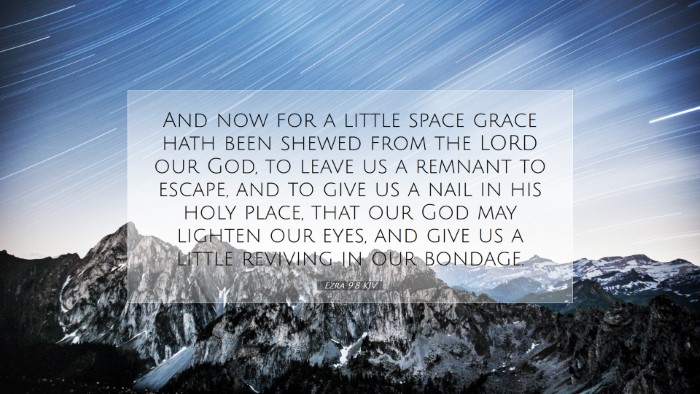Old Testament
Genesis Exodus Leviticus Numbers Deuteronomy Joshua Judges Ruth 1 Samuel 2 Samuel 1 Kings 2 Kings 1 Chronicles 2 Chronicles Ezra Nehemiah Esther Job Psalms Proverbs Ecclesiastes Song of Solomon Isaiah Jeremiah Lamentations Ezekiel Daniel Hosea Joel Amos Obadiah Jonah Micah Nahum Habakkuk Zephaniah Haggai Zechariah MalachiEzra 9:8
Ezra 9:8 KJV
And now for a little space grace hath been shewed from the LORD our God, to leave us a remnant to escape, and to give us a nail in his holy place, that our God may lighten our eyes, and give us a little reviving in our bondage.
Ezra 9:8 Bible Commentary
Commentary on Ezra 9:8
Bible Verse: Ezra 9:8 - "And now for a little space grace hath been shewed from the Lord our God, to leave us a remnant to escape, and to give us a nail in his holy place, that our God may lighten our eyes, and give us a little reviving in our bondage."
Introduction
Ezra 9:8 serves as a pivotal scripture within the context of Israel's return from Babylonian captivity. This verse encapsulates the themes of grace, hope, and God's faithfulness during a time of restoration. Various public domain commentaries, including those by Matthew Henry, Albert Barnes, and Adam Clarke, provide invaluable insights into this scripture, examining its theological implications and practical applications.
The Grace of God
Matthew Henry's Insight: Matthew Henry emphasizes the profound grace exhibited by God towards a remnant of Israel. He notes that despite their sinfulness and tendency to stray from God's commands, God provided a way of escape and a remnant. This grace is not only protective but also restorative, showing that God remains faithful despite human failures.
Albert Barnes' Commentary: Barnes highlights the significance of "a little space," suggesting that this "space" refers to a period of grace and opportunity for repentance and restoration. He underscores that God's actions are deeply intertwined with mercy, allowing a faithful remnant to remain as a testament to His enduring love.
The Concept of a Remnant
Adam Clarke's Perspective: Clarke speaks to the importance of the 'remnant' concept within the broader narrative of Scripture. Historically, the term signifies those who maintain their fidelity to God amidst widespread disobedience. Clarke points out that this remnant is crucial for the continued existence and witness of God's people.
- Spiritual Significance: The presence of a remnant indicates God’s enduring covenant with His people.
- Historical Relevance: Clarke also observes how this remnant plays a critical role in the genealogy of Christ, emphasizing the continuity of God's redemptive plan.
"A Nail in His Holy Place"
Matthew Henry on the "Nail": The metaphor of a "nail in His holy place" is rich with meaning. Henry interprets this as a symbol of stability and permanence in God’s presence. The remnant is not just left to survive but is given a significant place in God's redemptive work.
Albert Barnes Elaborates: Barnes expands on this imagery, explaining that a nail signifies the security and holding together of God's holy presence in the hearts of the faithful. It can also be understood as an assurance that God will continue to dwell among His people, providing light and comfort amid their struggles.
Divine Light and Reviving
Spiritual Illumination: Both Henry and Barnes agree on the themes of enlightenment and revival evident in the latter part of the verse. The phrase "lighten our eyes" illustrates a deep desire for spiritual awakening, a recurring motif throughout the Bible, particularly among those who have experienced exile.
Adam Clarke's Reflection: Clarke notes that the “little reviving” mentioned speaks to the spirit of hope bestowed upon the people of God. It represents a refreshing from God that enables them to persevere during their bondage while also fostering a relationship based on true repentance and spiritual renewal.
Theological Implications
Grace, Mercy, and Restoration: The combined insights regarding Ezra 9:8 provide a deeper understanding of God's character. He is a God who desires to show grace and mercy, delicately balancing justice with compassion. This scripture invites pastors, students, and theologians to ponder the significance of God's continued work in the lives of His people.
- Grace is Active: God's grace is not passive; it actively seeks to maintain a connection with His people.
- Hope Amidst Despair: The remnant signifies hope, reminding us of the potential for renewal even during dark times.
Practical Applications
This verse encourages believers today to recognize the importance of remaining faithful even when circumstances seem dire. There is always a space for grace, redemption, and a divine plan for restoration. Pastors and spiritual leaders may harness these insights to encourage congregations to lean on God's promises of renewal.
- Reflect on God's Grace: Emphasize the importance of recognizing God's active role in our lives.
- Encourage a Culture of Remnant: Inspire church members to live faithfully and protectively within their communities, serving as a remnant of hope.
- Seek Spiritual Reviving: Challenge individuals to pursue spiritual light and revival in their daily lives, trusting in God’s provision.
Conclusion
Ezra 9:8 offers profound insights into God's grace, the significance of the remnant, and the promise of revival even in the darkest of times. The comprehensive analysis drawn from public domain commentaries enhances our understanding of this scripture, imparting vital lessons for spiritual leaders and believers alike.


